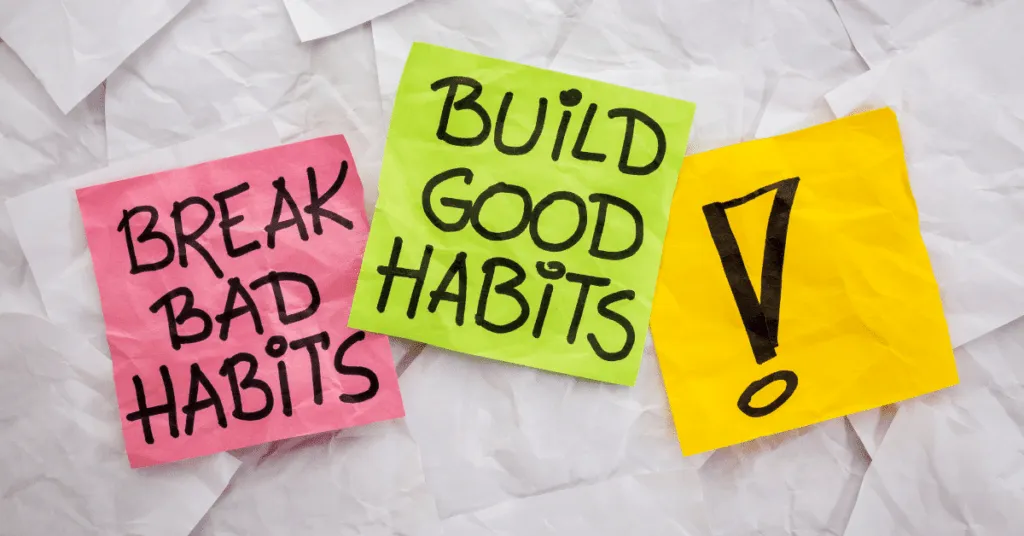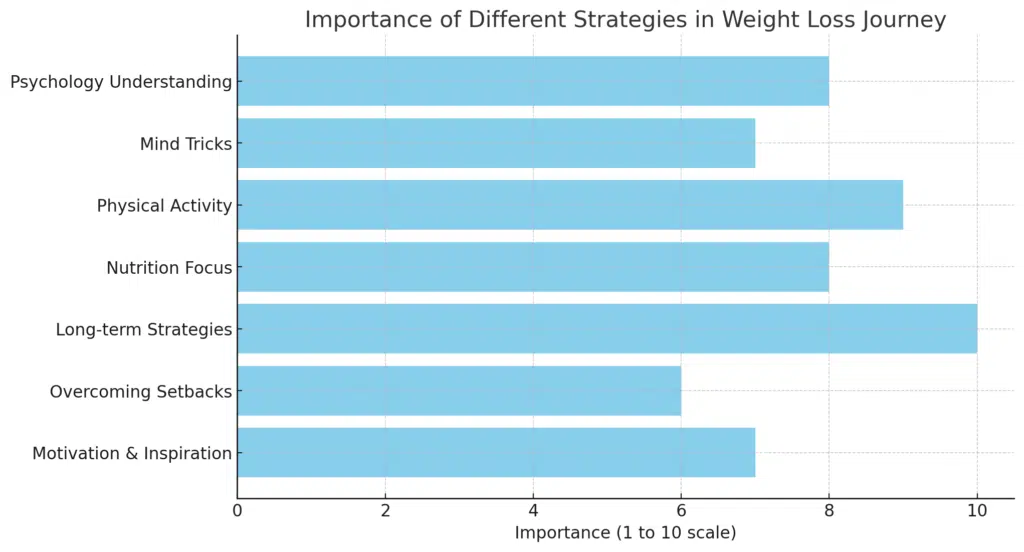Make Weight Loss a Habit With These Mind Tricks
Key Takeaways
| Aspect | Detail |
|---|---|
| Psychology | Understanding the mental approach to weight loss |
| Mind Tricks | Techniques to make weight loss a sustainable habit |
| Physical Activity | Integrating exercise into daily routine |
| Nutrition | Importance of meal planning and healthy eating |
| Long-Term Strategies | Maintaining weight loss over time |
| Overcoming Setbacks | Strategies to stay motivated |
Introduction
Embarking on a weight loss journey often feels like navigating through a maze of diets, exercise regimens, and fluctuating motivation levels. However, the secret to effective and lasting weight loss lies not just in what you eat or how often you exercise, but in transforming these actions into ingrained habits. This transformation requires a blend of willpower, psychological understanding, and a sprinkle of clever mind tricks.
At Good Fun Health, we believe in making fitness and health attainable and enjoyable. In this comprehensive guide, we delve into how you can train your mind to make weight loss a habit. From understanding the psychology behind eating habits to implementing practical and fun strategies, we’ve got you covered. Whether you’re just starting out or you’ve hit a plateau in your journey, these mind tricks are your allies in achieving and maintaining your health goals.
As the American Psychological Association highlights, willpower is a crucial component in this journey. But how do we harness this willpower and turn it into a lasting habit? Let’s explore together.

Understanding the Psychology of Weight Loss
Understanding the psychology behind weight loss is pivotal in turning your weight loss goals into reality. It’s about more than just choosing salads over burgers; it’s a mental game where your mindset plays a critical role. The journey begins with comprehending why we make the food choices we do and what drives our exercise habits.
The American Psychological Association sheds light on the concept of willpower, which is a vital psychological element in weight loss. Discover more about the power of willpower and its impact on habit formation. This understanding is crucial as it goes beyond mere discipline; it involves rewiring how we think about food, exercise, and our bodies.
It’s essential to recognize that weight loss isn’t just a physical process but a psychological one. The habits that lead to weight gain often stem from emotional triggers, stress, or simply long-standing routines that aren’t conducive to a healthy lifestyle. Breaking these patterns requires a conscious effort to understand and change our behavior.
Therefore, successfully losing weight and keeping it off involves a blend of cognitive-behavioral strategies that address both the mind and the body. It’s about setting realistic goals, understanding the triggers of unhealthy eating, and learning to cope with stress and emotions without relying on food. By grasping the psychological aspects of weight loss, you’re better equipped to make lasting changes that go beyond temporary dieting and into a lifelong journey of health and wellness.

Mind Tricks for Weight Loss
Transforming weight loss into a habit requires more than just knowledge; it involves clever psychological strategies or ‘mind tricks’ that can significantly influence your journey. Here are some powerful techniques to make weight loss a sustainable habit:
- Visualization Techniques: Imagine your ideal self – not just in terms of appearance, but in terms of health and wellbeing. Visualizing your goals can create a powerful motivation to achieve them.
- Setting Realistic Goals: Instead of aiming for rapid, drastic changes, set smaller, achievable goals. This helps in building confidence and maintaining motivation.
- Positive Self-Talk and Affirmations: Replace negative thoughts about your body or diet with positive affirmations. Remind yourself of your capabilities and strengths.
- Cue-Reward Systems: Associate healthy habits with positive rewards. For instance, after a week of healthy eating, treat yourself to a non-food reward like a spa day or a new book.
- Mindful Eating: Focus on the sensory experience of eating. Chew slowly, savor the flavors, and listen to your body’s hunger and fullness cues.
- Overcoming Mental Barriers: Identify what’s stopping you from losing weight, whether it’s emotional eating, stress, or lack of motivation. Address these barriers with specific strategies like stress management techniques or seeking support from friends or a professional.
Implementing these mind tricks can significantly boost your weight loss efforts. They help in forming a positive relationship with food and exercise, making weight loss not just a goal but a pleasant and sustainable journey.
Incorporating Physical Activity into Daily Routine
Physical activity is a cornerstone of effective weight loss and overall health. However, making exercise a regular habit can be challenging. Here are some strategies to seamlessly integrate physical activity into your daily routine:
- Find an Activity You Enjoy: Whether it’s dancing, hiking, swimming, or a specific sport, engaging in an activity you love can make exercise feel less like a chore.
- Set Specific Exercise Goals: Similar to weight loss goals, set clear and achievable exercise goals. Start with manageable targets and gradually increase the intensity or duration.
- Make It a Part of Your Daily Routine: Schedule your workouts like any other important activity. Consistency is key to forming a habit.
- Short, Fun Workouts: Not everyone has the time for lengthy gym sessions. Good Fun Health offers a fast, fun fat-burning workout that you can do in just 10 minutes. Check out this quick and effective workout for those busy days.
- Track Your Progress: Use apps or a journal to track your physical activity. This can be motivating and help you stay accountable.
- Involve Friends or Family: Working out with others can boost your motivation and make it a more enjoyable experience.
Incorporating these strategies can help make physical activity a natural and enjoyable part of your daily life, contributing significantly to your weight loss journey.
Nutritional Strategies for Weight Loss
Nutrition plays a crucial role in weight loss. It’s not just about cutting calories but about choosing the right foods that nourish and satisfy you.
- Meal Planning: Plan your meals in advance to avoid impulsive eating. Include a variety of nutrients in your diet.
- Mindful Eating: Pay attention to what you eat, savor each bite, and listen to your body’s hunger cues.
- Healthy Swaps: Replace high-calorie foods with healthier alternatives.
- Meal Replacement Shakes: For busy days, meal replacement shakes can be a convenient option. They’re quick, nutritious, and can help control portion sizes. Discover more about meal replacement shakes for weight loss at Good Fun Health.
- Stay Hydrated: Often, we confuse thirst with hunger. Drinking plenty of water can curb unnecessary snacking.
- Limit Processed Foods: Aim for whole, unprocessed foods for the majority of your meals.
Long-term Weight Loss Strategies
Maintaining weight loss over the long term is often the most challenging part of the journey. Here are some strategies to help you stay on track:
- Lifestyle Changes: Weight loss should be a lifestyle change, not a temporary diet. Focus on sustainable habits.
- Support Systems: Surround yourself with people who support your goals. Join a community or group with similar objectives.
- Continued Learning: Stay informed about nutrition and exercise. Knowledge is a powerful tool in maintaining weight loss.
- Structured Programs: Sometimes, a structured program can provide the guidance and accountability needed. Good Fun Health’s Complete 6-Week Fat Loss Bootcamp offers a comprehensive plan to kickstart your journey. Learn more about this effective program here.
- Regular Monitoring: Keep track of your progress. Regular weigh-ins and measurements can help you stay aware and motivated.
- Adaptability: Be prepared to adjust your strategies as your body and lifestyle change.
By integrating these long-term strategies into your life, you’re not just losing weight but embarking on a journey towards a healthier, happier you.

Overcoming Setbacks
Setbacks are a natural part of any weight loss journey. Here’s how to handle them:
- Acceptance: Understand that setbacks are normal and don’t reflect failure.
- Reflect on Causes: Identify what led to the setback and learn from it.
- Reset Your Goals: Sometimes, goals need adjustment. Be flexible and realistic.
- Seek Support: Reach out to friends, family, or professionals for encouragement.
- Stay Positive: Maintain a positive mindset and focus on your achievements.
- Resume Gradually: Ease back into your routine without overwhelming yourself.
Success Stories and Motivation
Inspirational stories can be powerful motivators. Consider these points:
- Shared Experiences: Reading or hearing about others’ success can boost your determination.
- Visualize Your Success: Picture yourself reaching your goals. This visualization can be a strong motivational tool.
- Celebrate Milestones: Acknowledge your progress, no matter how small.
- Maintain a Motivation Journal: Document your journey, including challenges and triumphs.
- Set New Challenges: Once you achieve a goal, set another. This keeps the journey interesting and challenging.
- Stay Inspired: Regularly seek out new sources of inspiration and motivation.
By overcoming setbacks and drawing inspiration from success stories, you can maintain the momentum and motivation needed for lasting weight loss.

Conclusion
In summary, making weight loss a habit is more than a physical challenge; it’s a mental one. By understanding the psychological aspects, employing mind tricks, integrating physical activity, focusing on nutrition, adopting long-term strategies, overcoming setbacks, and drawing inspiration from success stories, you can make your weight loss journey both successful and enjoyable.
Remember, it’s not just about reaching a number on the scale, but about embracing a healthier lifestyle.
Stay positive, stay motivated, and let each step forward bring you closer to your goals.








